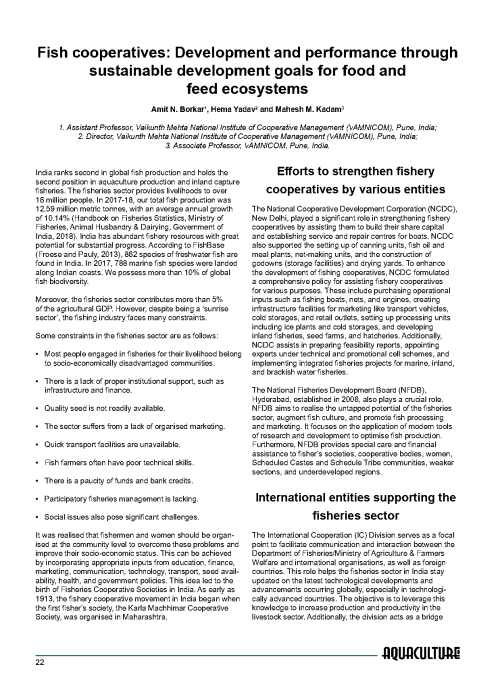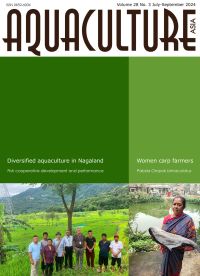Fish cooperatives: Development and performance through sustainable development goals for food and feed ecosystems
17 July 2024 | Amit N. Borkar, Hema Yadav and Mahesh M. Kadam | 2708 Downloads | .pdf | 185.37 KB | Freshwater finfish, India, Livelihoods, gender and social issues, Markets and trade
The global food security landscape is expanding. The rise of protein-rich fish within cooperative ecosystems marks a forthcoming revolution in protein consumption, promising to reshape food dynamics. As a primary source of food and feed, the fish ecosystem plays a crucial role in bridging nutritional gaps and securing food supplies. Climate change poses diverse challenges to agricultural productivity and yield, underscoring the importance of conserving water resources through adaptable food and feed ecosystems such as fish and fish cooperatives.
The objective of this study was to examine the inception and development of various schemes for fishery cooperatives during the NITI Aayog period (2015-2023) in India. Secondary data from January 1, 2015, marking the initiation of NITI Aayog, through June 2023 were analyzed. The study critically reviewed schemes implemented by the Department of Fisheries, Ministry of Fisheries, Animal Husbandry, and Dairying, particularly focusing on the "Pradhan Mantri Matsya Sampada Yojana"—aimed at catalysing the "Blue Revolution" through sustainable development of the fisheries sector with an investment of ₹200.5 billion over five years starting from fiscal year 2020-21 to 2024-25. The Fisheries and Aquaculture Infrastructure Development Fund (FIDF), with a total fund size of ₹75.22 billion, was implemented over a five-year period from 2018-19 to 2023-24 to provide concessional finance, along with the Kisan Credit Cards facility extended to fishers and fish farmers for their working capital needs nationwide.
The study aims to investigate the capacity building requirements of fisher cooperative societies and the challenges faced by fishery cooperatives in India. By conducting training needs assessments, enhancing capacity, strengthening businesses, and leveraging government schemes, the study seeks to advance the long-term objectives of the Sustainable Development Goals (SDG) related to poverty reduction, food security, equality, and institutional development. This initiative will bolster a resilient framework for food security and protein enrichment aligned with SDG targets, thereby fostering stakeholder prosperity within the fish cooperative ecosystem and addressing policy imperatives for sustainable development.
Creative Commons Attribution.

